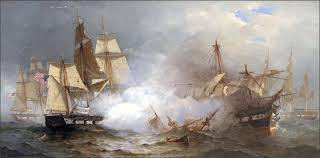WIlliam Huntriss (1780 – 1847) was born in Sherburn-in-Elmet, but moved to Halifax where he set up in business as a cotton spinner.
He seems to have done quite well for himself.

On 1st June 1814, he purchased the ship “Halifax Packet” for the sum of £3850, which at 2024 values is over a quarter of a million pounds.
Situated in the foothills of the Pennines, Halifax in West Yorkshire is not the first name that springs to mind when looking at maritime matters.
So what is the story?
War of 1812
From the outbreak of the Napoleonic war with France, Britain had imposed a naval blockade to choke off neutral trade to France. The US contested this as illegal under international law, and this led to the 1812 war between the United Kingdom and the United states, and their respective allies. The war was fought between June 1812 and February 1815.
The use of private resources for government purposes is not a new one. Privateers were privately owned armed vessel commissioned by a belligerent state to attack enemy ships, usually vessels of commerce. Privateering was carried on by all nations from the earliest times until the early 19th century. Crews were not paid by the commissioning government but were entitled to cruise for their own profit, with crew members receiving portions of the value of any cargo or shipping that they could wrest from the original owners.

The American schooner “Lottery” was launched in 1811, and was captured by the British in 1813. The Royal Navy took “Lottery” into service as HMS Canso a week after her capture under the command of Lieutenant Wentworth P Croke.
On 11 September 1813, HMS Canso captured the American schooner “Massachusetts”, carrying salt from Lisbon to New York.
The Massachusetts was subsequently sold to William Fairclough, Merchant, of Liverpool under the name “Halifax Packet”; in June 1814 he sold the vessel to William Huntriss.

Family business
For a while, William enlisted the services of his brother Henry to promote the ship.

It is not clear for how long that William Huntriss continued to be the owner of the ship. In 1817, a classified ad states suggests that the vessel is now registered in Londonderry.

Final voyage
Duncan Dunbar was born in the northern Highlands of Scotland in about 1791. He was ordained as a Baptist Minister, and moved to America in 1817. In the summer of 1819, he set sail with his wife and three children for Great Britain on behalf of the Evangelical Society of New Brunswick to obtain funds and missionaries.

Having accomplished his objectives, Mr Dunbar set sail for America from Londonderry on the Halifax Packet in the autumn of 1820. The voyage did not exactly go to plan.

The passengers watched sailors loading potatoes – they found out that the captain could not obtain the stones that would normally be used as ballast, and improvised by using potatoes instead. This was to prove providential.
The Halifax Packet proved totally unseaworthy, and after being out a month, was driven back by wind and wave to within a hundred or two miles of the Irish coast. They were at the mercy of the waves, no knowing in which part of the ocean they were. Without the compass, which was washed overboard, the captain had no means of making his reckoning.

The ship was provisioned for only eight weeks, and so the captain reduced the food allowance on board to all the passengers. When all provisions had gone, nothing remained between all those on board and starvation except the potatoes in the hold, which had not improved in quality by lying for many weeks in the damp hold.

This lasted for 16 weeks, until the sailors could no longer work the ship. The captain called on every man aboard to help. All took their turns at the pump – the ship was leaking badly.
One day, an immense whale came alongside the ship. He had to be watched day and night to make sure that he did not overturn the ship. The captain said that the whale had mistaken the ship for his mate, and would not leave until he had discovered his mistake.

On the day came on which the supply of potatoes ran out, a loud cry broke from the sailors on deck, echoing from the cabin and steerage – “Land ahead!”

They came ashore in Burmuda, having been at sea for six months.
In the words of Duncan Dunbar’s daughter:
“It will be wondered at that so miserable a craft should have been sent out on a winter voyage, so richly freighted with human life. We have been told that the ship was finely fitted up and well insured, although wholly unseaworthy, and that after the usual time out, not being reported as arriving, the policy was claimed and paid. Eternity will reveal whether or not the love of gold led her owners to bring those awful sufferings and perils on the innocent who trusted in their honour”
You can read the full story of the voyage here.
Condemned

Sunk
In 1824, William Huntriss was declared bankrupt.
Was this a result of his investment in the Halifax Packet?
Watch this space……..
